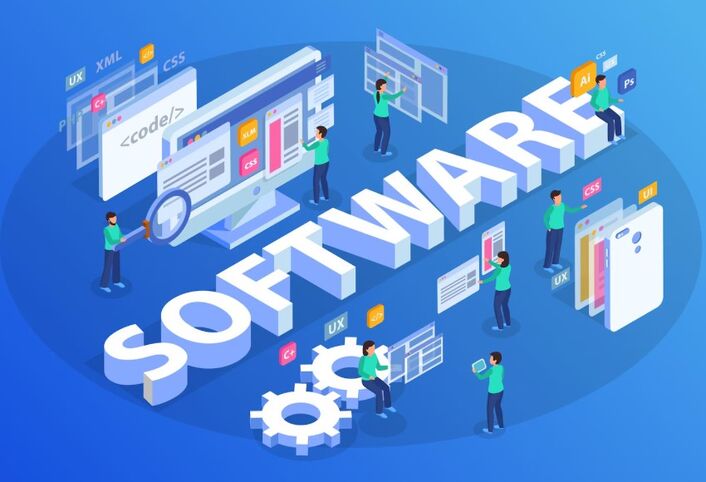In today’s digitized world, software development is becoming the very core of everything that businesses look for in innovation, efficiency, and growth. A deeper understanding of software development is a great asset for a small company or larger firm to get an edge in this competitive market in the United States.
Software development offers businesses a range of advantages, from creating apps and management systems to streamlining operations, enhancing the customer experience, and solving complex problems. Moreover, the right software solutions can boost productivity and improve decision-making. In this tutorial, we will discuss more about software development, its advantages, methodologies, and trends in the United States.
What Is Software Development?
Software development refers to the process of designing, building, testing, and sustaining software applications. It involves many tasks, including coding, debugging, and the deployment of applications across a range of different platforms.
So, it is necessary to heed the supply chain and quality management principles at some stage itself. Software development is about much more than the activities of writing code. It is about understanding what users want, drawing this need towards creating functional software, and continually enhancing the product to meet the market. This, in the end, can let businesses offer solid solutions and thus grow their sales and customer satisfaction.
Why Software Development is Essential for Businesses
ICTs and software solutions are at the heart of all United States companies, for relative safety, whether they deal with large financial accounts or the public’s health. Here are some reasons why software development is very important:
- Increased Efficiency – Custom software creates automation for more valuable tasks, enabling companies’ focus on things that create actual value.
- Better Customer Experience – The mobile app and the web portals create an excellent level of interaction for clients, thereby adding to customer satisfaction and promoting loyalty.
- Scalability – Software development allows businesses to scale their operations efficiently without having to change too much in processes.
- Competitive Advantage – Creating innovative software solutions distinguishes your company from competitors.
When it comes to the U. S. market, efficiency in response to market signals and customer demands assumes even greater importance and urgency.
Types of Software Development
Software development can be classified into different types depending on what suits the needs of a particular business:
- Web Development
Web development mainly deals with the creation of websites and web applications. In addition to working on UI design, the developer ensures that a website is secure, fast, and works on all popular devices. The popular tech stack is HTML, CSS, JS, and frameworks like React and Angular.
- Mobile App Development
Mobile App Development constitutes the development of applications for iOS and Android. Because of a sharp increase in smartphone users across the U. S., it is imperative to have mobile apps to reach out to customers and engage them.
- Development of Desktop Software
Computer software is basically designed to run on desktop computers or on laptops. Such applications include office productivity tools, design software, and financial management software. Conversely, desktop applications are known to wield strong powers unavailable with internet or Android applications.
- Software Development for the Enterprise
This is the software that is totally fine-tuned to be a large part of organizational work coordinated for purposes like HR, Finance, Supplies, etc. The great examples are ERP (Enterprise Resource Planning) and CRM (Customer Relationship Management). In enterprise software, data consistency is the most important skill, better collaboration possibilities and communication among the departments.

Software Development Life Cycle
It is very important to choose the right software development strategy in order to ensure the success of the project.
There are many cutting-edge technologies, which include:
Agile Methodologies
There are a plethora of agile development methodologies.
Agile emphasizes iterative development, collaboration, and adaptability. Teams work in short sprints, continuously improving the software based on user feedback. Moreover, Agile allows teams to respond quickly to changing requirements.
Waterfall Development
Waterfall is a linear, sequential approach where each phase must be completed before moving to the next. While less flexible than Agile, it is effective for projects with well-defined requirements. In addition, Waterfall provides clear documentation and milestones.
DevOps
DevOps combines development and operations to streamline deployment, improve collaboration, and ensure faster delivery of software updates. Furthermore, it emphasizes automation, continuous integration, and continuous delivery.
Scrum
Scrum aligns with Agile and is focused on incremental development using timeboxed sprints and regular team meetings, or “daily stand-ups” in the words of Ken Schwaber, its father. Consequently, it enhances transparency and ensures timely deliveries of features.
Furthermore, by carefully choosing a methodology that matches business needs, teams are not only more likely to deliver products of high standards but also get them to the market quickly.
The Major Benefits for U. S. Businesses of Software Development
Moreover, there are many advantages to investing in software development for businesses that are operating in the U.S., and as a result, companies can gain a competitive edge.
- Cost Efficiency – Custom software reduces operating costs by automating tasks and minimizing errors.
- Innovation – Software development allows businesses to use cutting-edge technologies that include AI, machine learning, and blockchain.
- Data-Driven Insights – Being able to surprise your competitors with the data strategy, or seeing this step as just another abstruse business process, what else could it be? Synergies from custom software ensure that the company and the organization come alive in the mud of a million data points.
They enable spatially neutral and temporally fluid work among employees, and cloud-based software solutions are increasingly becoming a priority for US companies.
Further, software development enables the organization to stay within set industry standards, helps to secure their customers’ sensitive data, and computerize/systemize their IT infrastructure further.
Recent Developments in USA Software Development
With the extraordinary, rapid, and ever-changing rate at which software developments are happening, the recent state of the industry is much about trends in today’s U. S. market:
- Artificial Intelligence and Machine Learning
AI-based software improves decision-making, lessens workload, and enhances user experience through personalization. Machine learning algorithms are trending in business applications for predicting and improving efficiency.
- Cloud Computing
Cloud software development allows businesses to host applications and data on remote servers, which helps to ensure increased scalability, security, and accessibility. The advantage of cloud solutions is that they reduce IT infrastructure costs and make maintenance easy.
- Low-Code and No-Code Platforms
Low-code platforms allow businesses to develop applications with minimal coding knowledge, thus lowering development time and costs. Furthermore, no-code platforms serve to assist non-tech people in contributing to app creation.
- Cybersecurity Integration
In a scenario with meta cyber threats looming, secure software development must be paramount. The United States firms are prioritizing the use of encryption technologies, secure coding practices, and monitoring in operation for the safe processing of crucial information.
- Mobile-First Approach
Mobile first-the broadest phrase- is seeing the developer put responsive applications on screen for mobile users. On the brighter side, by respecting this design, the application is made resilient across devices.
Choosing the Right Software Development Partner
Choosing a trustworthy software development company is imperative to the success of a project. Here are several tips that should guide you when you pick the right partner:
- Evaluate Expertise – Evaluate companies that have worked in your industry with your technology stack.
- Check Portfolio – Get a good look at past projects to determine quality and capability.
- Communication – Communication should always be open and clear with a good development partner; things work more smoothly this way.
- Agile Approach – Watch them using a methodology focusing on flexibility and regular updates.
- Support and Maintenance – Go for someone with good support and regular updates along with the development process.
Once these few steps have been completed, U. S. entities are promised a smooth software development tale, with clear benchmarks for measurement.
Conclusion
In brief, software development is a prime investment for US companies looking for growth, efficiency, and innovation. Software development from mobile and web applications to enterprise systems allows firms to stay competitive in a world where everything changes faster than ever.
Moreover, recognizing the various software development categories and selecting the correct project methodology while keeping an eye on industry trends can drive organizations to provide top-quality software solutions. In addition, the choice of a reliable software development partner to deliver is a sure way of having projects built on time, within budget, and with the required functionality.
Software development is the key strategy for long-term success in the US market for a start-up working on developing its first mobile application or a huge corporation working towards operational optimization.



